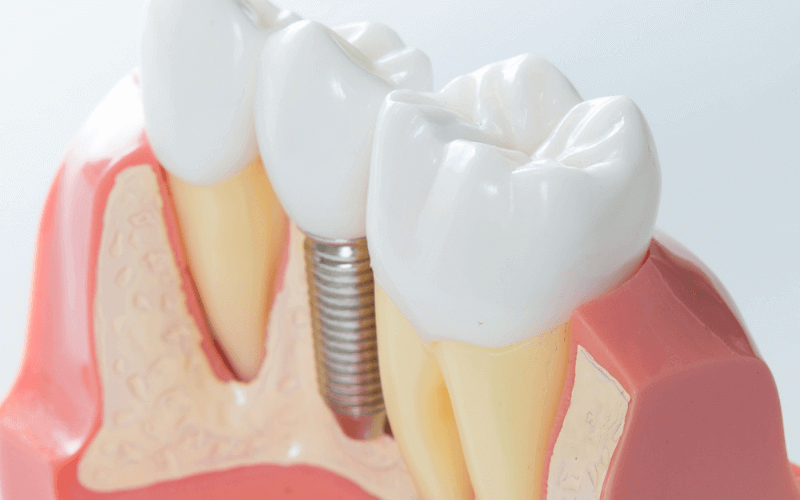Dental implants have revolutionised the field of dentistry, offering a durable and aesthetically pleasing solution for those missing one or more teeth. Today, the demand for dental implants continues to grow, driven by their ability to restore both function and appearance with remarkable success rates. However, understanding the costs associated with dental implants can be daunting due to the various factors that influence pricing.
In this comprehensive guide, we will delve into the details of dental implant costs in Australia. We aim to equip you with the knowledge needed to make informed decisions about your dental health. From the breakdown of costs and factors that affect pricing to the comparison with other tooth replacement options, this guide covers it all. Let’s get started.
In this blog:
- What Are Dental Implants?
- Types of Dental Implants:
- Benefits of Dental Implants:
- Factors Influencing Dental Implant Costs
- Average Cost of Dental Implants in Australia
- Comparison of Single-Tooth Implants and Full Arch Implants
- Dental Implants vs. Other Tooth Replacement Options
- FAQs About Dental Implants
- Get Quality Dental Implants at Dental Aspects
What Are Dental Implants?
Dental implants are a modern, highly effective solution for replacing missing teeth, providing both functional and aesthetic benefits. They consist of three main components: the implant fixture, the abutment, and the crown.
- Implant Fixture: A small titanium post that is surgically placed into the jawbone, acting as a root for the new tooth. Over time, the bone integrates with the titanium in a process called osseointegration, creating a stable foundation.
- Abutment: This component connects the implant fixture to the crown, sitting just above the gum line.
- Crown: The visible part of the implant, designed to look like a natural tooth.
Types of Dental Implants:
- Endosteal Implants:
- The most common type, placed directly into the jawbone.
- Typically shaped like small screws and made of biocompatible materials such as titanium.
- Suitable for most patients with healthy jawbone density.
- Subperiosteal Implants:
- Placed under the gum but above the jawbone.
- Used for patients with insufficient bone height who cannot undergo bone augmentation procedures.
- Consist of a metal frame that fits onto the jawbone beneath the gum tissue.
- Zygomatic Implants:
- Anchored in the cheekbone (zygoma) rather than the jawbone.
- Suitable for patients with severe bone loss in the upper jaw.
- Often used in cases where traditional implants are not feasible without extensive bone grafting.
Benefits of Dental Implants:
- Durability: Implants are designed to last many years, often a lifetime, with proper care.
- Aesthetic Appeal: They provide a natural look and feel, closely mimicking real teeth.
- Functionality: Implants restore full chewing ability, allowing patients to eat a wide variety of foods without discomfort.
- Bone Health: By stimulating the jawbone, implants help prevent bone loss that often accompanies missing teeth.
- Convenience: Unlike dentures, implants do not require removal for cleaning and do not slip or move in the mouth.
Dental implants offer a reliable and long-term solution for missing teeth, improving both oral health and quality of life for many patients.
Factors Influencing Dental Implant Costs
Understanding the various factors that influence the cost of dental implants is crucial for making an informed decision. Here are the primary factors that affect the overall expense of dental implant procedures:
- Type of Implant and Materials Used
Type of Implant: The specific type of implant chosen (endosteal, subperiosteal, or zygomatic) can significantly impact the cost. Endosteal implants, being the most common, generally have a standard cost range, while zygomatic implants, used in complex cases, tend to be more expensive.
Materials: High-quality, biocompatible materials such as titanium or zirconia are used for implants. Titanium is widely used due to its durability and successful osseointegration, while zirconia offers a more aesthetic option but at a higher cost.
- Number of Implants Required
The number of implants needed directly affects the total cost. A single-tooth implant is less expensive than multiple implants or full-mouth restorations. Patients requiring multiple implants might also need additional procedures, further increasing the overall expense.
- Complexity of the Procedure:
Bone Grafting: Some patients may need bone grafting to ensure there is enough bone to support the implant. This procedure adds to the cost and complexity.
Sinus Lifts: In the upper jaw, sinus lifts might be necessary to create sufficient space for the implants.
Extractions: Removal of damaged teeth prior to implant placement can also add to the overall cost.
Surgical Techniques: Advanced surgical techniques and the use of specialised equipment can increase the procedure’s complexity and cost.
- Geographic Location and Dental Clinic:
Location: Dental implant costs vary significantly based on geographic location. Urban areas and regions with higher living costs typically have higher dental fees.
Clinic Reputation: Clinics with highly experienced dental surgeons and state-of-the-art facilities might charge more for their services. However, these clinics often provide higher success rates and better overall patient experiences.
- Experience of the Dentist:
The expertise and reputation of the dentist performing the procedure play a crucial role in determining the cost. Experienced dental surgeons with a track record of successful implant placements may charge higher fees due to their specialised skills and higher success rates.
- Diagnostic and Preparatory Procedures:
Initial consultations, diagnostic tests (such as X-rays and CT scans), and planning sessions are essential components of the implant process. These preliminary steps contribute to the overall cost but are crucial for a successful outcome.
- Post-Operative Care and Follow-Up Visits:
After the implant procedure, follow-up visits and post-operative care are necessary to ensure proper healing and integration of the implant. These follow-up appointments, along with any additional treatments required, can add to the overall cost.
Understanding these factors can help you better prepare for the financial aspects of dental implant procedures. By discussing these elements with a dental professional, you can receive a detailed estimate and explore financing options to make the procedure more affordable.
Average Cost of Dental Implants in Australia
The cost of dental implants in Australia can vary significantly based on a variety of factors such as geographic location, the complexity of the procedure, and the dental clinic chosen. Here is a detailed look at the average costs across different states and types of implant procedures.

Average Costs by State
- New South Wales (NSW):
- Single-Tooth Implant: $3,000 – $6,000
- Multiple Implants: $15,000 – $30,000 (for a few implants)
- Full Arch (All-on-4) Implants: $20,000 – $35,000 per arch
- Victoria (VIC):
- Single-Tooth Implant: $2,500 – $5,500
- Multiple Implants: $14,000 – $28,000
- Full Arch (All-on-4) Implants: $18,000 – $33,000 per arch
- Queensland (QLD):
- Single-Tooth Implant: $2,800 – $5,800
- Multiple Implants: $15,000 – $29,000
- Full Arch (All-on-4) Implants: $20,000 – $34,000 per arch
These figures provide a general range for the costs of dental implants in different regions. It’s important to note that these are average prices, and the actual cost can vary depending on the specifics of each case and the chosen dental provider.
Comparison of Single-Tooth Implants and Full Arch Implants
- Single-Tooth Implant:
- Ideal for patients missing one or a few teeth.
- Involves a single implant fixture, abutment, and crown.
- The cost includes the surgical placement of the implant, the abutment, and the crown.
- Full Arch (All-on-4) Implants:
- Suitable for patients who have lost most or all of their teeth.
- Involves placing four implants in the jawbone to support a full arch of teeth.
- The cost includes the surgical placement of the implants, the abutments, and the fixed prosthesis.
Dental Implants vs. Other Tooth Replacement Options
When considering tooth replacement options, it’s important to compare dental implants with other available alternatives, such as dentures and dental bridges. Each option has its own set of benefits, costs, and considerations.
Dental Implants
Advantages
- Longevity and Durability: Dental implants are designed to last many years, often a lifetime with proper care.
- Natural Appearance: Implants closely mimic the appearance and function of natural teeth.
- Bone Health: Implants stimulate the jawbone, preventing bone loss that can occur with missing teeth.
- Comfort and Stability: Unlike dentures, implants are fixed in place, providing stability and comfort without the risk of slipping.
Disadvantages
- Cost: Implants are generally more expensive upfront compared to other options.
- Surgery Required: The implant process involves surgical procedures, which may not be suitable for everyone.
- Time: The entire process, from initial consultation to final placement, can take several months.
Dentures
Advantages
- Affordability: Dentures are typically less expensive than implants, making them a more accessible option for many patients.
- Non-Surgical: Dentures do not require surgery, making them suitable for patients who cannot undergo surgical procedures.
- Quick Solution: Dentures can be made relatively quickly compared to the time it takes to complete the dental implant process.
Disadvantages:
- Discomfort: Dentures can sometimes cause discomfort and sore spots in the mouth.
- Stability: Dentures can slip or move, especially when eating or speaking, which can be inconvenient and embarrassing.
- Bone Loss: Dentures do not stimulate the jawbone, which can lead to bone loss over time.
Suggested Reading: Dental Implants Vs. Dentures: What’s The Better Option?
Dental Bridges
Advantages
- Appearance: Bridges provide a natural look and can be matched to the colourcolor of existing teeth.
- Stability: Bridges are fixed in place, providing more stability than removable dentures.
- Faster Procedure: The process of getting a bridge is typically faster than getting dental implants.
Disadvantages
- Impact on Adjacent Teeth: Bridges rely on adjacent teeth for support, which means those teeth need to be ground down and can be weakened over time.
- Bone Loss: Like dentures, bridges do not prevent bone loss in the area of the missing tooth.
- Longevity: Bridges may need to be replaced every 5 to 15 years, depending on the materials used and how well they are maintained.
Cost-Benefit Analysis
Short-Term vs. Long-Term Costs
- Dental Implants: While the initial cost of dental implants is higher, they offer long-term benefits that can make them more cost-effective over time. Their durability and the prevention of bone loss can save on future dental procedures.
- Dentures and Bridges: These options have a lower upfront cost but may require more frequent replacements and adjustments, leading to higher costs over the long term.
Health and Functionality
- Implants: Provide the closest mimic to natural teeth in terms of functionality and appearance. They promote bone health and maintain facial structure.
- Dentures and Bridges: These options restore appearance and some functionality but do not offer the same level of stability or bone health benefits as implants.
Choosing the right tooth replacement option depends on individual needs, preferences, and budget. Dental implants offer significant long-term benefits in terms of durability, appearance, and bone health, making them a superior choice for many patients. However, dentures and bridges remain viable options, particularly for those seeking a more affordable or non-surgical solution. Consulting with a dental professional can help determine the best option based on your specific circumstances.
FAQs About Dental Implants
Understanding the common questions and concerns about dental implants can help you make informed decisions and alleviate any anxieties about the procedure. Here are some frequently asked questions about dental implants, along with expert answers:
1. What are dental implants made of?
Dental implants are typically made of titanium, a biocompatible metal that integrates well with the jawbone. Titanium is used for the implant fixture, which acts as the root of the artificial tooth. The abutment, which connects the implant to the crown, can also be made of titanium or zirconia. The crown itself is usually made of porcelain or ceramic, materials that mimic the appearance of natural teeth.
2. How long do dental implants last?
With proper care and maintenance, dental implants can last a lifetime. The crown attached to the implant may need to be replaced after 10-15 years due to normal wear and tear, but the implant fixture can remain intact for decades. Regular dental check-ups and good oral hygiene are crucial for the longevity of dental implants.
3. Is the dental implant procedure painful?
The dental implant procedure is usually performed under local anesthesia, so patients do not feel pain during the surgery. Some discomfort or soreness may occur after the anesthesia wears off, but this can typically be managed with over-the-counter pain medications. Most patients report that the post-operative discomfort is less than expected and subsides within a few days.
4. What is the success rate of dental implants?
Dental implants have a high success rate, typically ranging from 95% to 98%. Success rates can vary depending on factors such as the patient’s oral health, the quality of the jawbone, and the location of the implant. Choosing an experienced dental surgeon and following post-operative care instructions can significantly enhance the success rate.
5. How long does the dental implant process take?
The entire dental implant process can take several months from start to finish. The timeline includes:
- Initial Consultation and Planning: 1-2 weeks.
- Implant Placement Surgery: A single visit.
- Healing and Osseointegration: 3-6 months for the implant to integrate with the jawbone.
- Abutment Placement and Crown Fabrication: 2-4 weeks. The exact duration varies based on individual cases and any additional procedures needed, such as bone grafting.
6. Are there any risks or possible complications?
While dental implants are generally safe, there are some potential risks and complications, including:
- Infection at the implant site.
- Injury or damage to surrounding teeth or blood vessels.
- Nerve damage, causing pain or numbness.
- Sinus problems for implants placed in the upper jaw. However, these complications are rare and can be minimised by choosing a skilled dental surgeon and following proper post-operative care.
7. How should I care for my dental implants?
Caring for dental implants is similar to caring for natural teeth:
- Brush twice daily with a soft-bristled toothbrush.
- Use non-abrasive toothpaste.
- Floss daily to remove plaque and food particles.
- Use an antimicrobial mouthwash.
- Visit your dentist regularly for check-ups and cleanings. Proper care and maintenance are essential to prevent gum disease and ensure the longevity of the implants.
8. Can anyone get dental implants?
Most people who are in good general health and have adequate bone density in their jaw are good candidates for dental implants. However, certain conditions may affect eligibility, such as:
- Uncontrolled diabetes.
- Chronic illnesses or immune system disorders.
- Heavy smoking.
- Severe gum disease or bone loss. A thorough evaluation by a dental professional is necessary to determine if dental implants are suitable for an individual.
Dental implants are not just about replacing missing teeth; they are about restoring confidence, improving quality of life, and promoting long-term oral health. By investing in dental implants, patients can benefit from a solution that not only looks and feels natural but also supports overall dental well-being.
For those considering dental implants, it’s essential to consult with a dental professional to get personalised advice and detailed estimates tailored to individual needs.
Get Quality Dental Implants at Dental Aspects

At Dental Aspects, we specialise in providing high-quality dental implants to help you regain your smile and confidence. Our experienced team utilises the latest technology to ensure precise and comfortable implant procedures, tailored to your specific needs. Beyond dental implants, we offer a comprehensive range of services to cater to all your dental health requirements. Whether you need routine check-ups and cleanings, emergency dental care, cosmetic dental treatments like teeth whitening and veneers, or specialised services such as root canal treatment and dentures, Dental Aspects is your one-stop solution. Book your appointment today to maintain optimal oral health and achieve the perfect smile.
Keep Reading: 10 Questions To Ask Your Dentist Before Any Dental Procedure


